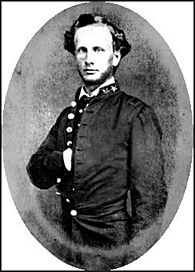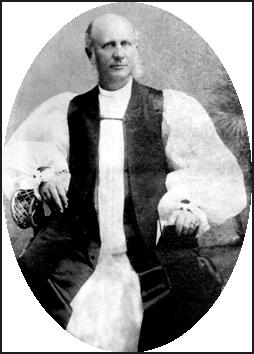Ellison Capers facts for kids
Quick facts for kids
Ellison Capers
|
|
|---|---|
 |
|
| Born | October 14, 1837 Charleston, South Carolina |
| Died | April 22, 1908 (aged 70) Columbia, South Carolina |
| Allegiance | |
| Service/ |
|
| Years of service | 1861–65 |
| Rank | Brigadier general |
| Commands held | 24th South Carolina Infantry Gist's Brigade |
| Battles/wars | American Civil War |
| Other work | Professor College President Episcopal Bishop |
| Ellison Capers | |
|---|---|
| Bishop of South Carolina | |
| Church | Episcopal Church |
| Diocese | South Carolina |
| Elected | May 4, 1893 |
| In Office | 1894–1908 |
| Predecessor | William B. W. Howe |
| Successor | William A. Guerry |
| Orders | |
| Ordination | September 13, 1868 |
| Consecration | July 20, 1893 by Theodore B. Lyman |
Ellison Capers was an important person from South Carolina. He was born on October 14, 1837, and passed away on April 22, 1908. During his life, he was a general in the Confederate Army during the American Civil War. He also became a college professor, an administrator, and later, an Episcopal bishop.
Contents
Ellison Capers' Early Life
Ellison Capers was born in Charleston, South Carolina. His father was a leader in the Methodist church. Ellison went to local schools and then to the South Carolina Military Academy. This school is now known as The Citadel.
He graduated from The Citadel in 1857. For a while, he studied law. Then, he became a professor at the South Carolina Military Academy. He taught mathematics and public speaking. He also taught at Mt. Zion College for a year. In 1860, he returned to his teaching job at the academy.
Ellison Capers in the Civil War
When the Civil War began, Ellison Capers joined the Confederate Army. He started as a major. He was present when Fort Sumter was attacked. He also fought in battles at James Island and Secessionville.
After these battles, he helped defend the coast. He was promoted to lieutenant colonel of the 24th South Carolina Infantry. In May 1863, his regiment joined General Joseph E. Johnston's army. They were part of the Vicksburg Campaign. Capers was hurt in the leg during the Battle of Jackson. Even so, he was promoted to colonel.
Capers returned to fighting in time for the Chickamauga Campaign. He was part of the Army of Tennessee. He fought in the very difficult Battle of Franklin. Here, he was badly wounded again. After this campaign, he took command of a brigade. He replaced States Rights Gist, who had died in battle.
Ellison Capers was promoted to brigadier general on March 1, 1865. This was just before the war ended. He was captured at Bentonville, North Carolina.
After the War: A New Career
After the Civil War, Capers went back home. In December 1865, he was chosen as the Secretary of State for South Carolina.
In 1868, he became an Episcopal Priest. He served as the minister of Christ Church in Greenville. At the same time, he taught at several schools. These included Greenville Military Academy, Greenville Female Academy, and Furman University.
In 1875, he became a minister in Selma, Alabama. After a year, he returned to Christ Church in Greenville. In 1887, he moved to Trinity Church in Columbia, South Carolina.
Becoming a Bishop
Ellison Capers was chosen to be a Coadjutor Bishop of South Carolina. He became a bishop on July 20, 1893. The next year, in 1894, he became the main bishop of South Carolina. He was the third bishop for the area.
He served as the Episcopal Bishop of South Carolina until he passed away in 1908. He also worked as the chancellor of Sewanee: The University of the South. This was from 1904 to 1908. He was also on the board of the John F. Slater Fund. This fund helped educate formerly enslaved people.
In 1859, he married Charlotte Rebecca Palmer. She was a great-granddaughter of Francis Marion. They had five children together. His sister Mary was married to Major Peter F. Stevens. Stevens was also a professor at the South Carolina Military Academy. He later became an Episcopal Bishop too.
Bishop Capers died in Columbia, South Carolina, in 1908. He is buried there at Trinity Episcopal Churchyard.
Honors and Legacy
In 1889, the University of South Carolina gave him an honorary Doctorate of Divinity degree. This is a special award for his religious work.
A group called the Sons of Confederate Veterans named their camp after him. It is called the General Ellison Capers Camp #1212.
Capers Hall is a main building at The Citadel. It is named after Ellison Capers and his brother, Major Francis W. Capers. His brother was the Superintendent of The Citadel from 1852 to 1859. Ellison Capers gave the graduation speech at The Citadel in 1886.


